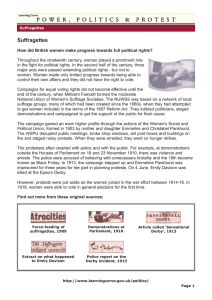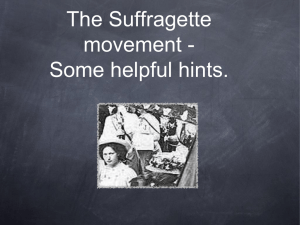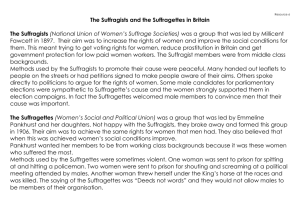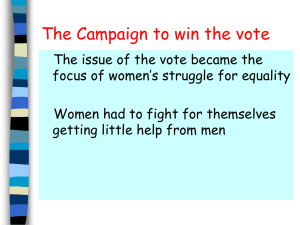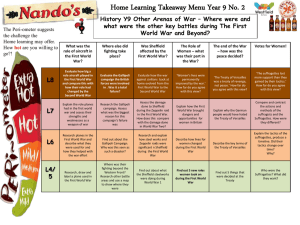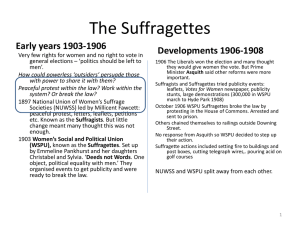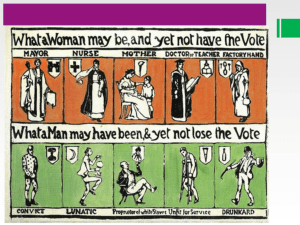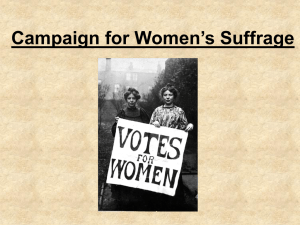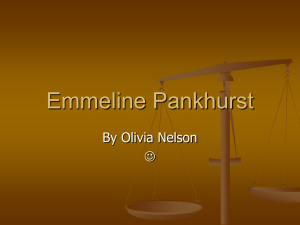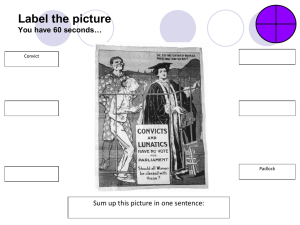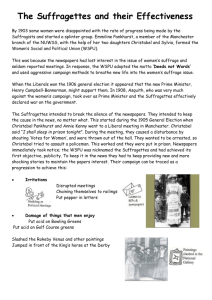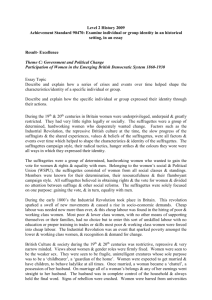Deeds not Words Lesson 2
advertisement
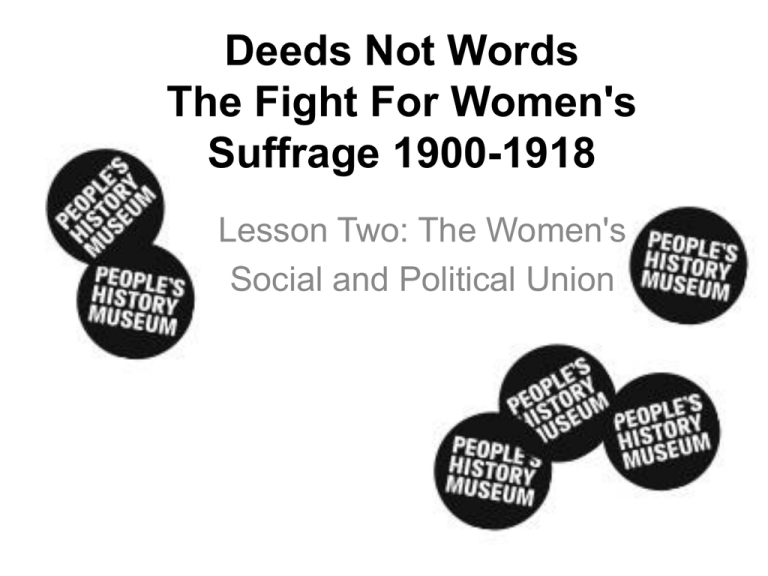
Deeds Not Words The Fight For Women's Suffrage 1900-1918 Lesson Two: The Women's Social and Political Union How many can you name? Kylie Minogue Cheryl Cole Emma Watson Madonna How many can you name? Annie Kenney Emily Davison Emmeline Pankhurst Hannah Mitchell What we will learn today: • Assess violent protest as a form of campaigning. • The women's movement and the militant suffragettes. • The tactics used by the suffragettes and their impact. • Establish whether or not the suffragettes helped to get women the vote. Watch this video and write down four words to describe it. Click here to play In groups read through the newspaper extracts. ‘Parliament Square Gardens was subjected to sustained and violent attacks by some protesters, intent on mayhem, who ripped down fencing, set fire to benches., broke windows and even went so far as to launch a fire extinguisher from the roof of the Conservative Party Headquarters’ ‘The protests over MPs voting to increase university tuition fees in England to up to £9,000 a year turned violent on Thursday.’ ‘The protesters who chose to wreak havoc on our city should also be aware of the potential greater cost to London's global reputation as we prepare to host the world during the 2012 Games.’ Task One Answer these questions in your workbooks. 1) What was the protest about? 2) What do you think the protesters wanted to achieve? 3) Do you think violent protest is the way to get things achieved? 4) Did the protest result in what they wanted? • The suffragettes were a militant women's campaign group that were willing to use violent tactics to achieve the vote. • The WSPU was founded by Emmeline Pankhurst and her daughter Christabel on 10 October 1903 in their Manchester home. • During her time working as a registrar of births, marriages, and deaths Emmeline was struck by the troubles single women faced to raise their children. She believed that women needed to lose their subordinate role and campaign for the vote if they were to progress in society as equals to men. Militant: Aggressive, hostile, violent or destructive behavior in support of a cause. Founders of the WSPU Women's Social and Political Union The Suffragettes Deeds not Words Methods • Believed in using militancy (violence) to gain the vote. Setting fire to empty buildings, chaining themselves to railings, smashing windows, and damaging golf courses • Series of 6 meetings in 1908 attracted more than 25,000 women. The suffragettes gained publicity through propaganda, leaflets, newspapers, marches and demonstrations. 1908 Demonstration Hyde Park and £1,000 spent on publicity. RBK Militant Tactics • 1909 Imprisoned suffragettes started going on hunger strike. • Many women who went on hunger strikes were force fed by a tube though the nose and liquid food would be poured into their stomachs. Many were made very ill as a result. Temporary Discharge for Ill Health Act 1913. Introduced by Henry Asquith and the Liberal Government , the Act was a response to petitions from councils against forced feeding. • Public opinion was against the idea of women being force fed. To deal with this, suffragettes on hunger strikes would be released until they were in better health and would then be re-arrested. • This became known by suffragettes as the CAT AND MOUSE ACT, as you can see from this suffragette propaganda poster. • 18 November 1910: Black Friday 150 suffragettes hurt in violence outside parliament. • 1912-14 Wild Period begins arson attacks, acid spilt on golf courses, letter boxes vandalised and telephone wires cut. Emily Wilding Davison • On 4 June 1913, Emily Davison was severely injured when a protest for women suffrage went wrong at the Epsom Derby. • Emily stepped out into the race course in front of the King’s horse. She was kicked by horses hooves and died on 6 June from her injuries. • There has been debate about what she was trying to do. • In the primary source discussion you have to analyses the video and interpret what you think Davison was try to do. Did she intend to kill herself in protest, or was it a protest gone wrong? Primary Source Task • Get in to groups. •When doing source work, don't forget your 4 Ws! 1) 2) 3) 4) When was it written? Who wrote/created the source? Why was it created/written? What does it say? • You then have to prepare your activity to present to the class. The death of Emily Davison. Click here to play Sister Suffragette Click here to play An Emmeline Pankhurst speech Click here to play Start to create the Facebook page in your workbooks for the WSPU. Complete this for homework.
